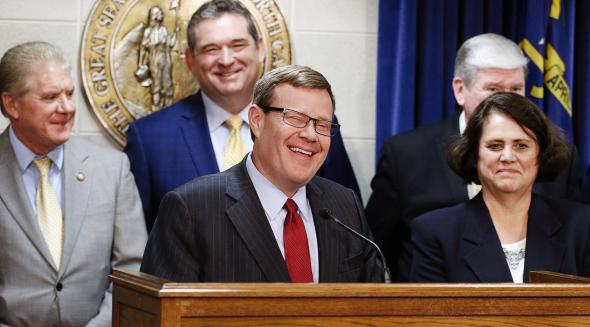Just weeks after a court struck down the centerpiece of North Carolina Republicans’ legislative coup, the GOP-dominated legislature has initiated a new power grab that will once again strip authority from the Democratic governor and curtail voting rights throughout the state.
This week’s vote marks another attempt by Republicans to consolidate power before judicial intervention and shifting demographics threaten their dominance in the state. Their trouble began in December, when Republican Gov. Pat McCrory finally conceded defeat to his Democratic rival Roy Cooper. Days earlier, a federal court had ruled that Republicans’ veto-proof majorities in both houses of the legislature were the result of an unconstitutional racial gerrymander and ordered new elections. The GOP felt its grasp on power slipping away—so it held a special session to dilute Cooper’s authority and restrict the franchise.
A key feature of the insurgence was an overhaul of the state election board. Previously, the governor appointed five members to the board—three from his or her party and two from the minority party. In turn, the state board appointed three members to each county election board—two from the governor’s party and one from the minority party. These boards created and implemented rules regarding voting procedures, including early and absentee voting, registration, ballot access, and precinct location. Under McCrory, Republicans held a majority on every board, and they used this power to curb voting rights quite effectively. After a federal appeals court blocked a voter suppression law for “target[ing] African Americans with almost surgical precision,” for instance, state and county election boards implemented the law’s worst provisions anyway.
Cooper’s election should have allowed Democrats to retake control over these boards, reversing voter suppression rules and expanding suffrage. But the GOP thwarted Cooper by completely reorganizing the boards. A bill passed during the December session combined the state election board with the State Ethics Commission, creating a “New State Board” with eight members. The governor and the legislature would each select four members, and the board could only take action with a supermajority of six votes. A Republican would chair the board during election years; a Democrat would chair it during non-election years. And county boards would gain a member, with each board split between two Republicans and two Democrats.
A state court struck down this rearrangement in March, holding that it violated the state constitution’s command of separation of powers. The election board, the court explained, is “primarily executive in nature,” meaning the governor “must have enough control over [the appointees] to perform his constitutional duty” to “faithfully execute the laws.” By creating perpetual deadlock, Republicans had granted the governor “inadequate control” over the board. Their maneuver effectively barred him “from ensuring faithful execution of the laws”—thereby infringing upon powers constitutionally assigned to the executive branch. Thus, the court invalidated the election board overhaul.
Republicans responded to that ruling this week by slightly rewriting the unconstitutional bill and swiftly passing the altered version. Their new measure still merges the state election board and ethics commission, creating “The North Carolina Bipartisan State Board of Elections and Ethics Enforcement.” This reshuffled board would still have eight members, four Democrats and four Republicans. The governor would choose all eight members, albeit from a list submitted by both party chairs, and the board could take action with a vote of five members instead of six. County election boards would again be given an extra member and split between two Republicans and two Democrats.
The House and the Senate have already passed this new bill, thanks to the GOP’s dominance in both chambers. Cooper has vowed to veto it, but Republican supermajorities are bound to override his veto. It will therefore fall upon the courts once again to determine whether the GOP can lawfully hobble Cooper’s efforts to restore voting rights. Given the North Carolina constitution’s unusually stringent separation of powers requirement, the bill appears likely to fail. It would, after all, engender the same deadlock problem as the old measure: Divided evenly between parties, the state and county boards will probably reach a constant impasse. In striking down the previous election board law, the court evinced serious concern about this stalemate problem; indeed, fear of indefinite deadlock compelled the court’s conclusion that the law improperly usurped power from the governor. The new bill presents the same problem in a slightly less extreme form. No court should be fooled by the legislature’s attempt to repackage the old bill; a slightly less unconstitutional law is still unconstitutional.
Progressives, however, may not be able to rely on the state judiciary for long. In March, Republicans passed a law, over Cooper’s veto, restoring partisanship to judicial elections by requiring District Court and Superior Court judges to undergo a party primary, and including their political affiliation on the general election ballot. Republicans also sent a bill to the governor on Tuesday that would shrink the state Court of Appeals, depriving Cooper of the ability to replace retiring judges. And in December, the GOP made state Supreme Court elections partisan again after a liberal judge won a seat on the bench. Give North Carolina Republicans some credit: They are, at least, consistent in their quest to seize and maintain as much power as possible, at the expense of anyone—from governors to judges to voters—who dares to stand in their way.
